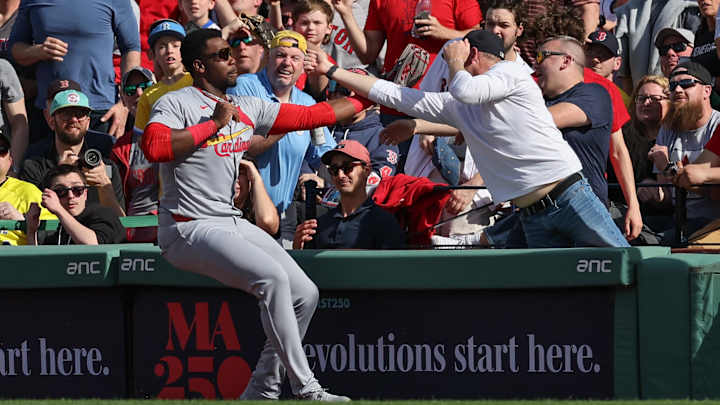The Cardinals and Red Sox kicked off their series with fireworks both on the scoreboard and in the stands. But while the offense lit up the night, one moment in particular left everyone players, fans, and commentators alike scratching their heads. A bizarre fan interference call in the bottom of the fifth inning ended up giving Boston their eighth run, and the aftermath was nothing short of chaos.
Here’s how it all unraveled:
Kristian Campbell lofted a fly ball down the right field line that looked like a routine out. Cardinals outfielder Jordan Walker made a running grab while stumbling into the side wall, clearly focused on completing the play. But just as he reached for the ball, a Red Sox fan—arms stretched into the field of play made contact with Walker mid-catch.
Fan interference? Absolutely. But the weird part came after.
Triston Casas, tagging from third, dashed home and scored. Walker, clearly aware of what had happened, immediately pointed out the interference to the umpiring crew. The Cardinals challenged the play. The umps got on the horn with New York. Everyone waited. Confusion swirled. And then… the run stood. 8-5, Red Sox.
How?
At first glance, it made no sense. Interference was called. Walker was touched. Yet the run counted. But when you slow things down and watch the replay, the reasoning begins to emerge though it doesn’t make it any less head-scratching.
Walker, though brushed by the fan, had his momentum taking him away from the infield. Even without interference, he would’ve needed a near-perfect throw to get Casas at the plate. And let’s be honest, the odds of that happening were slim. By catching the ball, Walker essentially kept the play alive albeit with a delayed protest allowing Casas to score legally by tagging up.
Now here’s where things get even more interesting.
If Walker hadn’t caught the ball and instead let it drop, the fan’s interference may have triggered a completely different ruling. According to MLB rules, if fan interference prevents a fielder from having a chance to make a play on a fair ball in the field of play, umpires can call the batter out. In that case, Casas’ run likely wouldn’t have counted, and Boston would’ve been stuck with just seven runs on the board.
Bobby Meredith (@BobbyMeredith2) pointed this out on X, and it’s a solid observation. But you can’t fault Walker. He made the natural baseball play catch the ball, secure the out, worry about the rest after. Ninety-nine times out of a hundred, that’s the right call. The odds of fan interference in that exact moment? Incredibly slim.
Still, the entire sequence revealed something deeper: fan interference rulings are filled with nuance, and depending on how the play unfolds, the outcome can lean heavily on umpire discretion. That’s frustrating for fans who crave consistency. One minute you’re celebrating an out, the next you’re watching the other team add a run while the umpiring crew holds a conference call with HQ.
If the situation were reversed, and the Cardinals benefited from the exact same chaos, Red Sox fans would probably be just as upset. And that’s the part about baseball that keeps us coming back—it’s equal parts skill, chance, and chaos, all wrapped up in nine innings.
So yeah, the call might’ve been confusing. Maybe even controversial. But given how the play played out, it might just have been the right one. Begrudgingly.




